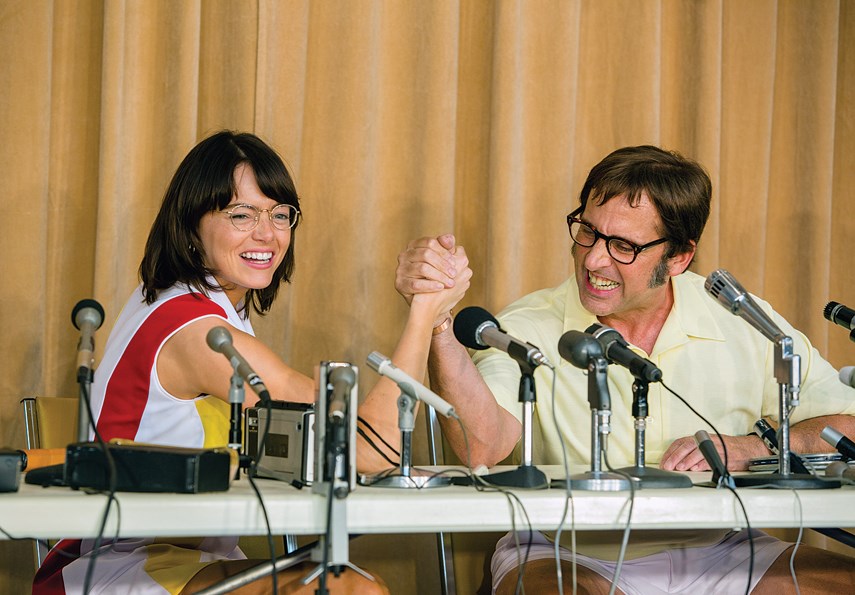Battle of the Sexes. Directed by Jonathan Dayton and Valerie Faris. Starring Emma Stone and Steve Carell. Rating: 7 (out of 10)
“Number one, the woman should stay in the bedroom. Number two, they should get to the kitchen.”
“When I come home and dinner’s not ready, I go through the roof ... I think putting a wife to work is a very dangerous thing.”
That first statement was made by former Wimbledon- and tennis World-Champion Bobby Riggs. The second is from an interview with ABC news with now U.S. President Donald Trump.
It’s disheartening that the feminist struggles of 40-plus years ago resonate so similarly to today’s politics, but that’s clearly the intent of Battle of the Sexes, a tennis movie that’s not really about tennis.
Ostensibly, the film chronicles the lead-up to the much-publicized September 1973 tennis match between 55-year-old Riggs and female No. 1 player Billie Jean King, dubbed “the battle of the sexes” by the media. Avowed male chauvinist – and unapologetic gambler – Riggs (played by Steve Carell) offered a staggering $100,000 to any woman who could beat him in a tennis match.
First Riggs handily beats pro Margaret Court, an “easy triumph against motherhood and women’s lib,” according to one commentator. Already a vocal proponent of equal pay for women, King (Emma Stone) had no option but to take up the gauntlet.
The film, then, is mostly about the journey of female tennis players to be taken seriously in an age where owners, backers and the media (hello, Howard Cosell) could only talk about how good the girls looked on the court.
King was already causing an equal-rights ruckus when she discovered that the male players in a major 1973 tournament were being offered prize money that was eight times higher than the purse offered to the female players. The men are better athletes and more exciting to watch, reasons organizer Jack Kramer (Bill Pullman). “It’s not your fault, it’s just biology.” In retaliation, King organizes a boycott and starts her own tourney – Virginia Slims to the rescue – founding the Women’s Tennis Association, active to this day.
The move rankles and threatens men including Riggs, bored in his retirement from tennis and not getting the attention he craves. In the lead-up to the tourney with King he engages in a variety of publicity stunts, including dressing up like Little Bo Peep and playing tennis on a court full of sheep. Carell has not just the physical resemblance in his favour, but the clownish antics of Riggs are also no great stretch.
King meanwhile, trains like a demon but has her first great personal crisis chipping away at her focus. Married to Larry King since 1965, Billie Jean begins an affair with her free-spirited hairdresser Marilyn Barnett (Andrea Riseborough) but risks her career if the relationship goes public. The film sanitizes this part of the story and the circumstances of King’s outing to the public: a 1981 lawsuit levelled by Marilyn, who had tried to commit suicide by jumping from a building and was left paralyzed from the waist down, made the unsuccessful palimony fight headline news.
Despite her sweet reputation, Stone plays the tennis great with no small amount of quiet power; but passion for the game is missing from co-directors Jonathan Dayton and Valerie Faris’ portrait of the first female athlete to win the Presidential Order of Freedom.
You’ve come a long way, baby. Indeed. Someone send POTUS a carton of Virginia Slims.



